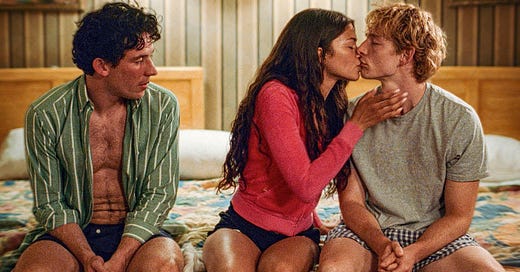'Challengers' Review: Luca Guadagnino Serves Up Vapid Steam
Zendaya in this tennis-based star vehicle lacks conviction off the court
This review was originally published on Letterboxd.
I’ve always been hit-or-miss on Luca Guadagnino. I love the hot ennui of “A Bigger Splash” and the crumpled body horror of “Suspiria.” I further enjoyed the melancholic endless summer at the center of “Call Me By Your Name.” And yet, I found “Bones and All” to be far too reserved for its sticky premise, and thought his television series “We Are Who We Are” was a melodramatic, politically inert snooze fest.
His latest film, “Challengers,” has a horny pulse, carried by a throuple whose steaminess can be felt on the tennis court more often than off. It follows a very similar formula to his other films, stoking the appetites of youth to provide an open forum for unbridled desire to let loose. And yet, more than any of his other lovesick travails, “Challengers” is the most vapid—relying on a kind of transgression that fails to transgress.
“Tennis is like a relationship.” It’s a comparison that the film, spoken by once-promising tennis star turned calculating wife-manager Tashi Duncan (Zendaya) can’t help but remind viewers. The nonlinear storytelling begins in the “present” day (the film is set in 2019, with only a halfhearted attempt by Guadagnino to make reference to the fraught political climate)—where Tashi has scheduled her grand slam winning husband Art Donaldson (Mike Faist) to play at a small qualifying tournament to get him back on track ahead of the US Open. Competing against him is his former best friend and doubles partner, the scruffy, wily Patrick (Josh O'Connor). We jump back and forth from their final round match, a win the lowly-ranked Patrick needs, to how the two men first met Tashi—leading to the collapse of their unrequited partnership.
There are three distinct romances in Guadagnino’s steamy film: Tashi and Patrick, Tashi and Art, and Art and Patrick. The strongest is the queer coupling. Mostly because Faist and O’Connor are such strong actors. The slippery, unreliable, and selfish Faist gives a slick performance (I really think Faist would make an excellent Noir lead; he has that sense of disenchantment necessary for such walled-in men). O’Connor, meanwhile, is repeating some beats from his turn in “La Chimera,” portraying a similarly talented failure, one whose greasy exterior obscures his privileged background. Patrick is more of a cipher than a fully fleshed out character. But O’Connor pulls much from Patrick, giving every horny scene between him and Faist an alluring flicker that offers the briefest possibility of “Challengers” actually being sexually and physically challenging.
The heterosexual pairings, however, leave much to be desired. Guadagnino uses the carnal tennis play as both a nifty editing trick—with each forceful volley he switches perspective to another character—and as sensual foreplay into each relationship. Guadagnino, visually, goes full tilt in the tennis scenes. At times, we’re actually in the perspective of the ball. It’s an aesthetic choice that will have a limited runway with some, but that I enjoyed. I’d rather see a director take a big swing than no swing at all.
Ultimately, I don’t think Zendaya is very good in “Challengers.” I kept getting the sense she was aiming for Lauren Bacall in “To Have or Have Not” (the way Bacall’s fiery glamor makes Humphrey Bogart uncontrollably laugh under her spell) or the icy intensity of Barbara Stanwyck. But Zendaya simply doesn’t possess the ease or economy necessary to pull off such a toughened hard-luck character. Now, to be fair, this is a demanding, complex role. In fact, I think she has the hardest part of the trio. She needs to be feisty, steely, and erotic while cooly protecting a performance whose last narrative grace note isn’t really worth the secrecy. It always feels like she’s playing the emotion rather than feeling the emotion, lacking the steaminess and the knowing cynicism required for the role.
Though Guadagnino is often hit-or-miss for me, I can’t deny that he is a fantastic actors director: He nurtured Chalamet, guided Taylor Russell to an enrapturing performance in “Bones and All” and even tricked many in to believing that Armie Hammer could act. The man’s resume is spotless in that respect. He does much for Zendaya here. High angle shots of Zendaya’s fixed eyes add a smoky intensity to her; evocative flushed red lighting gives her angular features a ruthless sharpness, and she gets the BIG movie star close-ups where she can play the hints of a deeper character atop the scene’s sensual jolt. At every turn, he trusts her in a way I wish more directors would trust their stars. But Zendaya isn’t ready to take such tight reins. So her major moments are unfortunately labored, rigid, and broad.
Ultimately, I like the idea of “Challengers” more than the film itself (this is to say nothing of the lax run time and the odd mixing between dialogue and Ross/Reznor’s throbbing score). Worst yet, I can’t help but feel there is an edgier version of this film—one that was unafraid to cast one of its bright shining stars as a villain and was intrigued by the complicated souls of lustful beings. This is a crowd-pleasing, horny film—the type we need more of—that could have been significantly better, significantly more memorable and provocative with finer casting and a firmer desire to disquiet the viewer.





After watching the trailer for Challengers, I knew I didn’t have it in me. Yes, I judged the book by its cover, but now I know I wasn’t wrong after reading your review.